
and Planning
Agriculture Policy and
Planning
Core Functions
The Vertical formulates innovative programs and policies tailored to the agriculture and allied sectors, addressing emerging challenges while capitalizing on opportunities. It also provides inputs and suggestions on key policy decisions to the Government of Tamil Nadu, by working closely with these allied sectors like Agriculture, Animal Husbandry, Dairy Development, Fisheries, Cooperation, Civil Supplies, Water Resource Department, and Public Works Department.
Sectoral Discussions
The Vertical convenes discussions with the officials of the sectoral departments, in a regular manner. These discussions serve to align stakeholders on the implementation status of schemes by the State or Central government, share best practices within departments, identify sectoral issues and challenges, and outline a strategic path forward. Planning Commission members offer valuable insights and recommend best practices to the departments, with these suggestions subsequently submitted to the Government for consideration.
Research & Knowledge Sharing
The Vertical conducts both in-house research studies and partners with research institutes and academia. These studies analyze emerging issues, such as problems faced by farmers, food security, and the impact of various policies and developmental programmes. The Vertical also organises workshops that bring together key stakeholders and experts in the domain.
Sectoral Departments
This Vertical coordinates with the following sectoral departments and their line departments:
Agriculture and Farmers’ Welfare Department
- Directorate of Agriculture
- Directorate of Horticulture and Plantation Crops
- Commissionerate of Agricultural Marketing & Agri. Business
- Agricultural Engineering Department
- Directorate of Seed Certification and Organic Certification
- Tamil Nadu Agricultural University Commissionerate of Sugar
Animal Husbandry, Dairying, Fisheries and Fishermen Welfare Department
- Directorate of Animal Husbandry and Veterinary Services
- Directorate of Fisheries
- Commissioner for Milk Production and Dairy Development Department
- Tamil Nadu Veterinary & Animal Sciences University
- Tamil Nadu Dr. J. Jayalalithaa Fisheries University
Cooperation, Food and Consumer Protection Department
- Commissioner of Civil Supplies & Consumer Protection
- Tamil Nadu Civil Supplies Corporation
- Registrar of Cooperative Societies
- Tamil Nadu Warehousing Corporation
Public Works Department
- Public Works Department
Water Resource Department
- Water Resource Development
The vertical also coordinates with related sectoral Institutions like,
- National Bank for Agriculture and Rural Development (NABARD)
- Agricultural and Processed Food Products Export Development Authority (APEDA)
- Marine Products Export Development Authority (MPEDA)
- Coastal Aquaculture Authority (CAA)
- M S Swaminathan Research Foundation (MSSRF)
Assessments & Studies
Rural Development
Sustainable Farming
Livestock Management
Veterinary Science
Agricultural Innovation
Water Management
Study on the status and scope of export of medicinal plants and phytomedicines in Tamil Nadu (SPC)
The study on medicinal plants had comprehensive objectives, including assessing global trade trends, conducting a landscape analysis of Tamil Nadu’s cultivation status, evaluating export potential, and examining the impact of Read More
Economic Impact of Poultry Development Scheme on the Livelihood Enhancement of the Beneficiaries and Promotion of Entrepreneurship in Rural Areas in TN
The study evaluates the 2018-2020 Poultry Development Scheme implemented in Tamil Nadu, aiming to enhance livelihoods and create rural entrepreneurship. Read More
Report on Evaluation study of Augmenting Fertility and Reproductive Potential in Buffaloes through Estrus Synchronization using low cost and indigenously developed Progesterone implant at backward blocks of Krishnagiri District
The paper evaluates a project funded by SBGF that aims to improve fertility and reproductive potential Read More
Report of Task Force on Agriculture Development
The report extensively covers various aspects of agriculture development in Tamil Nadu, addressing issues, schemes, and innovations. It suggests initiatives like Integrated Farming Systems (IFS), community bore wells, and farm ponds to address water scarcity. Additionally, Read More
Study on Nutrient Composition of Millets and Ways to Minimize Loss During Processing and Value Addition
The paper discusses the iron content and nutrient suitability of different varieties of millet for product development. It also highlights the challenges faced by millet growers, such as the time and energy required for millet-based Read More
Strategies to Mitigate the Impact of Poor Monsoon on Agriculture
The paper discusses the adverse effects of poor monsoon on agriculture in Tamil Nadu, including drought, poor agricultural productivity, rural distress, and water and fodder shortages. It emphasizes the need for a combination of coping and adaptation strategies, such as changes in crop Read More
Evaluation of Major Ongoing Animal Husbandry and Fisheries Schemes in Tamil Nadu
The evaluation focuses on the high growth potential of the livestock sector, emphasizing its role in providing employment for rural communities and youth. The study aims to review the performance of the scheme by analyzing Read More
The Impact of Collective Farming on Improving Productivity, Production, and Income of Farmers of Salem District
The study in Salem district focuses on mobilizing small and marginal farmers through Farmer Producer Groups to share knowledge on improved agricultural practices and cost-effective technologies, aiming to enhance productivity. Objectives include providing financial assistance for group formation, social capital Read More
Assessing the Sub-sector contribution of State income and its potential
The study assesses agriculture in Tamil Nadu, noting a relatively low growth rate in gross and net state domestic products compared to other sectors. The share of cereals in the agricultural GDP has risen, driven by paddy Read More
Evaluation of rice productivity improvement in Tamil Nadu
The paper evaluates the impact of the System of Rice Intensification (SRI) on rice productivity improvement programs in Tamil Nadu, focusing on factors such as crop establishment, yield, resource use, and net profits for farmers. Researchers across the state have studied the effects of SRI Read More
Evaluation major Rainfed Crop Production Programmes for Increasing in Dry Land Agriculture
The paper evaluates major rainfed crop production programs aimed at increasing productivity in dryland agriculture. The paper concludes that evaluation plays a vital role in the planning and implementation of development programs Read More
Evaluation of the Horticultural Development Programme
Horticultural crops offer a wider scope for income increase to farmers compared to field crops, but they are resource-intensive, perishable, and seasonal in nature. Storability is limited and requires special arrangements like cold storage, which are normally not affordable by farmers. Read More
Constraint analysis in the utilization of Agricultural Marketing Institutions with special reference to regulated market
The paper discusses the constraints in the utilization of agricultural marketing institutions, with a focus on regulated markets. It highlights the changes in the agricultural marketing scenario over the last two decades, Read More
Extension Methodology for effective dissemination of technology to the farming community
The implementation of the Training Visit (TV) program in Tamil Nadu faced challenges such as inadequate manpower, a lack of proper facilities for extension functionaries, and a focus on targets and achievements rather than results and outcomes. Read More
Dairy Development Schemes
The paper discusses the tremendous annual compound growth rate of the livestock and poultry population in Tamil Nadu from 2004 to 2007, which may be attributed to the implementation of various development programs in the livestock sector. The paper also highlights the importance of chaff cutters, Read More
Poultry Development Schemes
The paper evaluates the implementation of a poultry scheme in Sivagangai district, Tamil Nadu, through a group discussion with the beneficiaries. The beneficiaries express their opinions on the prospects and constraints of the scheme. The poultry sector in India has experienced significant growth, Read More
Animal Disease Control Measures
The paper discusses the need for a separate Disease surveillance and vaccination wing at the block level to enable periodic farm gate vaccination and reduce the impact of animal diseases on livestock productivity. The paper identifies the approach, mandate, target, and present status Read More
Small Ruminants Development Schemes
The paper discusses the factors contributing to the spoilage of feed, inadequate supply of inputs, and the need for continuous monitoring by veterinary doctors in sheep and goat rearing. It also highlights the importance of deworming, treatment, and vaccination facilities in reducing diseases, Read More
Fisheries Schemes
The paper discusses the allocation of funds for fish seed rearing in cages, with a total cost of Rs.4.00 lakhs, including capital and input costs, provided as 100% subsidy for two years. It highlights the inadequacy Read More
Development of Veterinary Institutions, measures for strengthening the Veterinary Services and Effective disease control and Training Centre-Industry-Institution links
The paper focuses on developing veterinary institutions, strengthening services, and establishing disease control centers. It highlights the importance of stronger connections between veterinary services, industry, and institutions. Measures include increasing crossbred cattle and milk production, expanding Read More
To Quantify the Impact of Energy Crisis on Irrigation
The paper aims to quantify the impact of the energy crisis on irrigation. It discusses the increase in groundwater overdraft, the cost of well deepening, and the reduced extraction rate. The government implemented agricultural input subsidy policies to overcome low agricultural production and food shortage, Read More
Identification of Strategies to increase the Productivity at Small and Marginal Farms in Tamil Nadu
The paper addresses the low productivity of crops in Tamil Nadu due to suboptimal use of inputs and lack of market integration, particularly among small and marginal farmers. It highlights the challenges faced by small farmers Read More
Workshops
Rural Development
Sustainable Farming
Livestock Management
Veterinary Science
Agricultural Innovation
Water Management
Workshops and Seminars related to the sectors have been organized based on various concepts such as emerging issues, matters requiring immediate interventions, new themes, etc. The recommendations of the workshops are forwarded to the concerned departments for suitable action. Some of the Workshops conducted by the Vertical are:
Volumetric Measurement of Irrigation Water
The rapid population growth creates new demands on water resources for all processes viz food production, municipal supply, industrial water use, power generation, navigation and recreation. The workshop briefed on technologies for measuring the volumetric use of water in Agriculture and the major interventions for revamping the irrigation system.
Potentials of Processing and Value Addition in Agriculture and Allied Sectors in Tamil Nadu
The workshop explored processing and value addition in agriculture, utilizing waste from horticultural crop processing, and opportunities in red meat, dairy, poultry, and fish products in Tamil Nadu. Key outcomes included post-harvest management, establishing agribusiness incubator cells at the Taluk level Read More
ALGAE - The Potential Bio-Fuel
Algae are a very large and diverse group of simple, typically autotrophic organisms, ranging from unicellular to multicellular forms, and most are photosynthetic. Algae is a potential fuel source that can produce biodiesel, methane, and hydrogen and also serves as an excellent food supplement, as most of the algae have essential complete proteins with essential amino acids and a high amount of simple and complex carbohydrates besides having an extensive fatty acid profile, including Omega 3 and Omega 6, which is very good for health. Read More
Development of Inland Fisheries in Tamil Nadu
The fisheries sector is one of the most important food production sectors in the state, contributing to the livelihood and food security of a large section of the economically underprivileged population. In recent years, it has assumed greater significance, and its contribution to the State and the National economy in terms of livelihood and nutritional security, rural employment generation, and foreign exchange earnings has been enormous. The workshop recommends adopting an inland water body fish culture system Read More
MILLETS to Combat Diabetes
Millets are scientifically proven to be ahead of rice and wheat in terms of nutrition content. The workshop recommends awareness of the health benefits of millets, one millet meal per day and oats in the dietary schedule for diabetic/cardiac patients, promotion of ready-to-cook millets through PDS/cooperative outlets, production-oriented schemes of SHGs, setting up of block-level small-scale processing units of production new generation millet food products and development through research.
Youth in Agriculture & Allied Sectors
The workshop recommends millet agripreneurship to create rural employment opportunities, establishment of ornamental fisheries park on PPP mode that facilitates the infrastructure for entrepreneur to venture into fisheries business, promotion of ornamental fish exports, organizing trainings for ornamental marine fisheries, skill development to farmers for making agriculture to attain the industrial status, popularizing ICT enabled concept like e-mandi, e-valanmai and mobile based agro advisories, compendium of bankable Read More
Hi-Tech Horticulture - A Profitable Venture
The workshop focuses on transforming Hitech horticulture into a profitable venture. Recommendations include converting fallow lands into horticultural farms through PPP, implementing a pedigree/scion policy, ensuring timely availability of quality inputs, promoting high-tech banana varieties, adopting ultrahigh-density planting, diversifying crops, replicating successful banana cultivation models, organizing supply chain management workshops, and forming horticultural crop clusters. Capacity building for farmers to become Read More
Issues in the Adoption and Dedoption of System of Rice Intensification (SRI) in Tamil Nadu
The workshop focuses on upscaling the System of Rice Intensification (SRI) through key components such as transplanting young seedlings (preferably 14-15 years old), square planting of single seedlings with 25 cm x 25 cm spacing, adopting mechanical weeding, implementing alternate drying and wetting, and reducing nursery area and seed rate. Adequate training on SRI planting methods is recommended for women laborers and potential Self-Help Groups (SHGs). Encouraging local artisans and blacksmiths to produce Read More
Strategies for Increasing Buffalo Population in Tamil Nadu
The workshop suggests the formulation of a New Buffalo Policy to improve and promote the buffalo population, encourage subsidy schemes for cattle and fodder, formation of new women SHGs to promote and develop the buffalo population, undertake intensive research on increasing the buffalo population/quality semen production/breed adaptability, and creation of awareness of the economic advantage of buffalo rearing among the farming community.
Millets Promotion in Tamil Nadu
Millets are gaining popularity globally due to their nutritional benefits. They are gluten-free, rich in nutrients, and have a lower glycemic index compared to rice and wheat. As a result, millets are being explored as a potential solution to food security and nutrition challenges. Millets are superior to rice and wheat in many nutritional parameters. All these benefits and more were addressed in this workshop.
Integrated Farming System
The workshop aims to enhance synergy among crop enterprises by uniting stakeholders from agriculture and allied sectors. Its goal is to identify opportunities for increasing economic yield per unit area and time through crop and allied enterprise intensification. To boost overall productivity, the workshop suggests adopting improved cropping systems based on rainfall and soil moisture availability, selecting suitable grain crops and tree species year-round, and utilizing surplus fodder and crop residue during the rainy season, preserving Read More
Important Development Programmes in Animal Husbandry
The livestock sector is directly linked to the livelihoods of more than 70% of rural households and provides gainful employment for the rural poor and youth. This workshop highlighted working out the socio-economic impact of important veterinary development schemes, developing projects to help sex selection in animals and elaborated on strategies and plans for bridging the demand-supply gap in green fodder production which could suitably address the issues in fodder marketing. Additionally, the workshop discussed the development of schemes Read More
Important Development Programmes in Agriculture
The State Planning Commission conducted the workshop to initiate the second green revolution in the state, to raise farmers’ economic standing through wider use of frontier technology for improving crops with full farmer participation. The workshop makes recommendations for a system of rice intensification, rainfed agriculture, promotion of millets, market linkage, R&D, crop insurance, and community borewells.
Ongoing Works
Current Studies/Assessments of Schemes
- Augmenting the potential of the Food Processing Industry in Tamil Nadu
- Potential and Challenges in the recycling and reuse of water waste in urban areas
Gallery
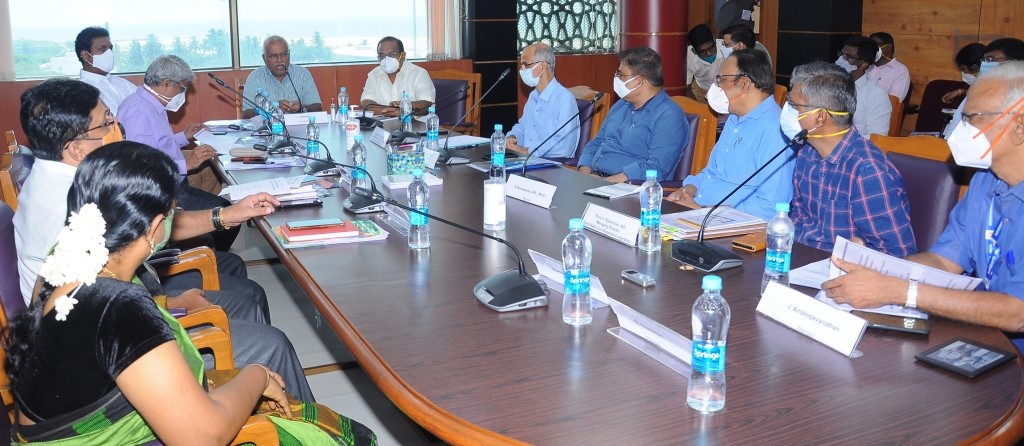
Tamil Nadu Civil Supplies - Sectoral meeting on 07.07.2021
Tamil Nadu Civil Supplies - Sectoral meeting on 07.07.2021
Dr. J. Jeyaranjan, Vice Chairman SPC during a consultative discussion with Thiru. R. Sakkarapani, Hon'ble Minister, Food and Civil Supplies in July 2021
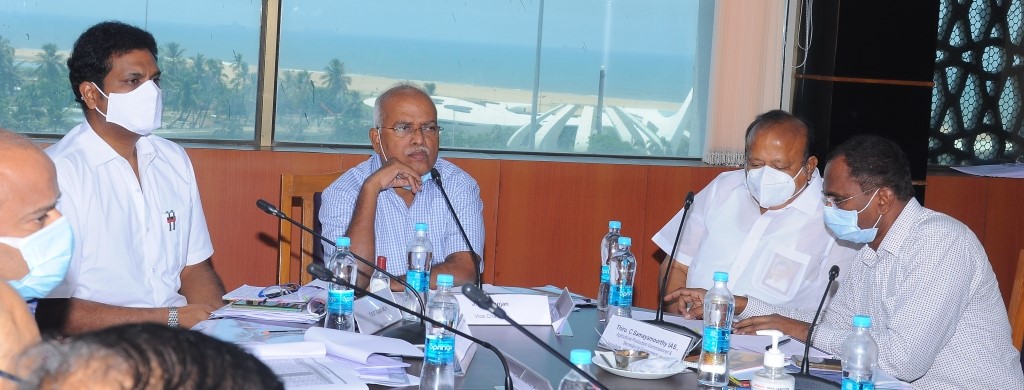
Agriculture Sector Meeting on 08.07.2021
Agriculture Sector Meeting on 08.07.2021
Dr. J. Jeyaranjan, Vice Chairman SPC and D. Baskarapandian IAS. Member Secretary, SPC during a consultative discussion with Thiru. M.R.K. Panneerselvam, Hon’ble Minister, Agriculture and Farmer’s Welfare in July 2021
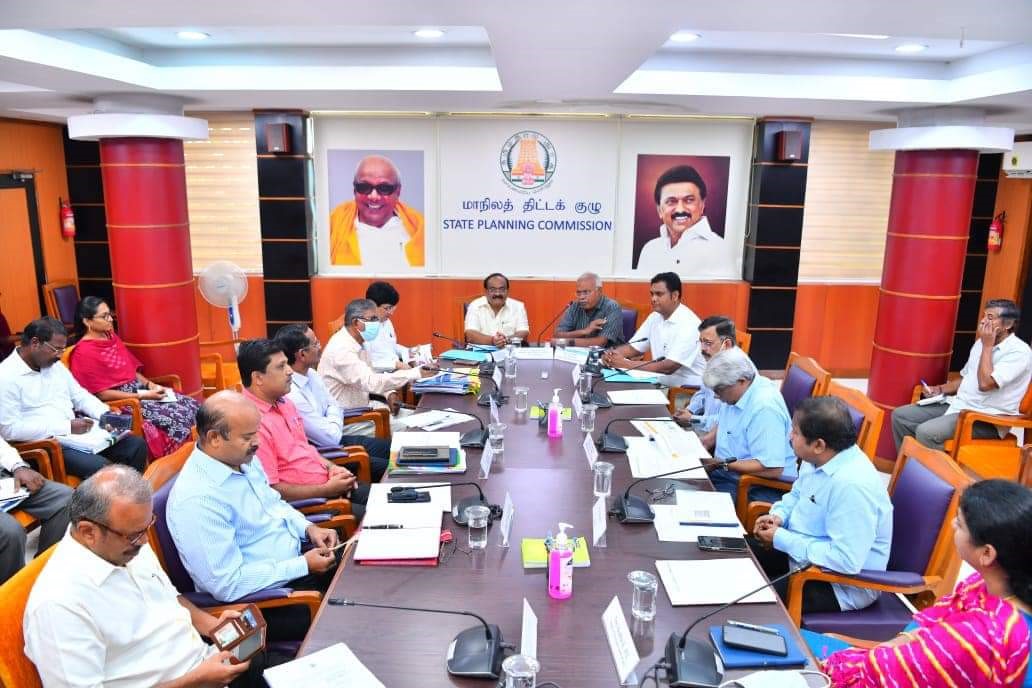
Tamil Nadu Cooperation, Food, and Consumer Protection Department – Sectoral meeting
Tamil Nadu Cooperation, Food, and Consumer Protection Department – Sectoral meeting
Dr. J. Jeyaranjan, Vice Chairman and T.S. Rajasekar IAS. Member Secretary, SPC during a focussed discussion with Thiru. R. Sakkarpani, Hon’ble Minister, Food and Civil Supplies, Consumer Protection and Price Control in November 2022
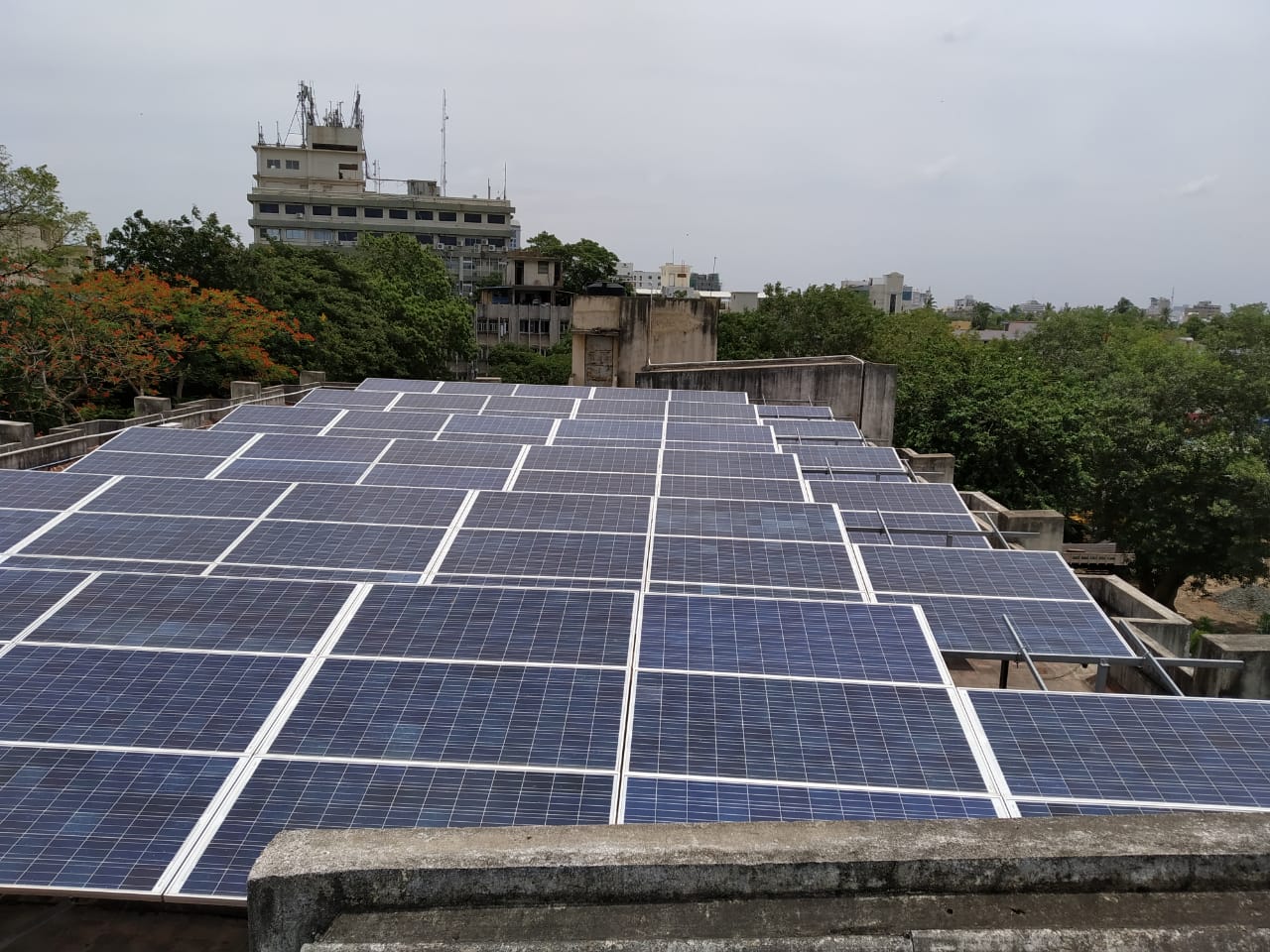
AED Office Solar panel installation under TANII
AED Office Solar panel installation under TANII
A model grid tie solar photo voltaic power plant without battery for a capacity of 30 kW has been installed in the office of Chief Engineer (AE), Chennai-35 under the Tamil Nadu Innovation Initiatives Scheme.
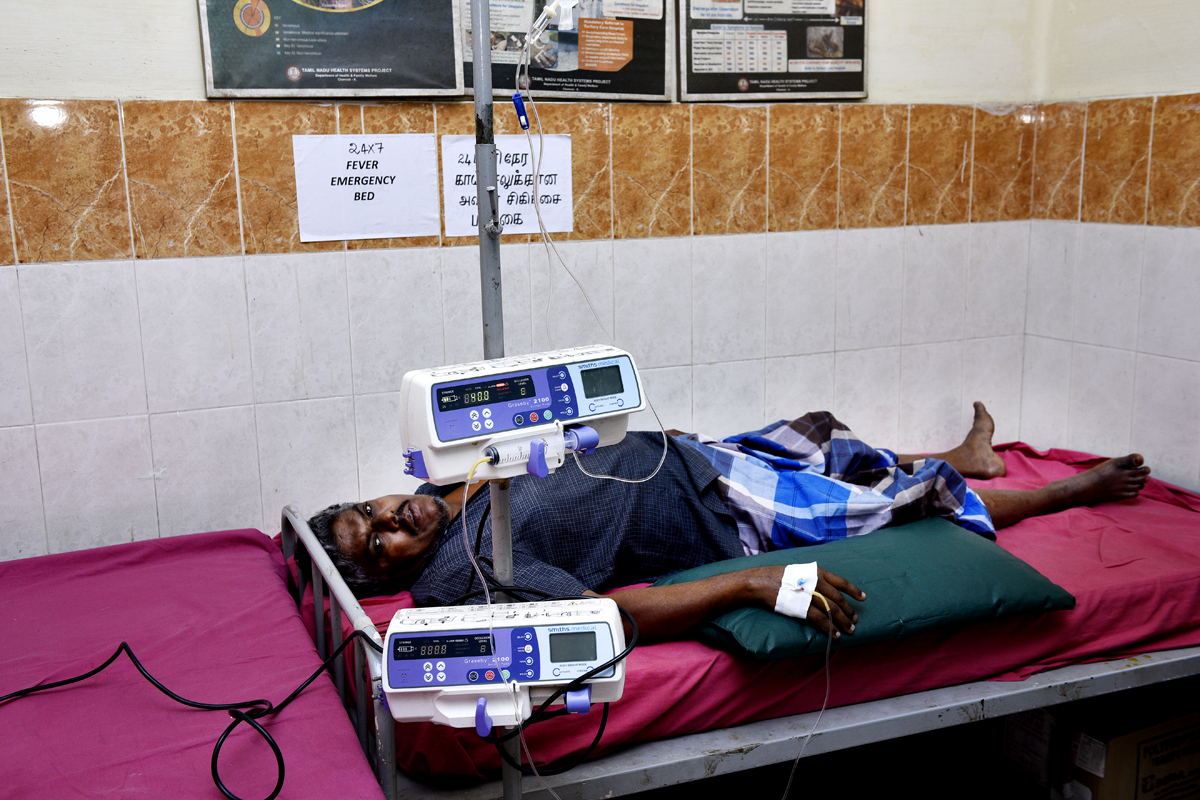
Thalassemia Equipment Installation
Thalassemia Equipment Installation
A unit for treating Thalassemia in humans for the benefit of Harur, Pennagaram, Karimangalam, Palacode, Pappireddipatti, Morapur, and Nallampalli Blocks in Dharmapuri District has been installed under the State Balanced Growth Fund (SBGF) scheme.
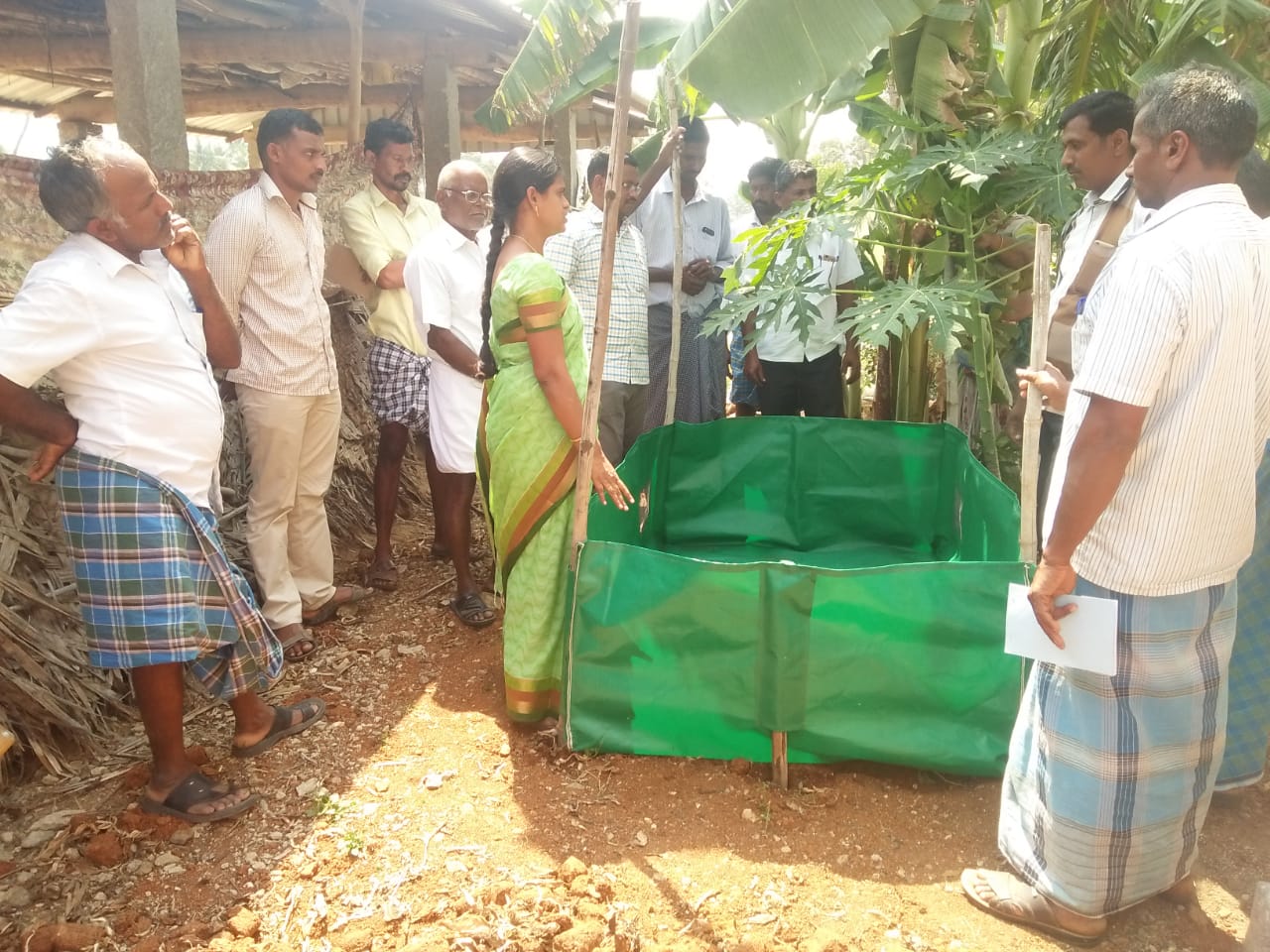
Vermi livelihood development
Vermi livelihood development
Vermicompost Production from Farm Wastes for Improving the Soil Fertility and Productivity at the Farm Level in Dharmapuri District has been promoted under the State Balanced Growth fund.

TANUVAS - BSL- Lab building
TANUVAS - BSL- Lab building

TANII funded project by TANUVAS
TANII funded project by TANUVAS
The Small Animal Experimentation Facility (BSL -3 )Laboratory has been established at Tamil Nadu Veterinary and Animal Sciences University (TANUVAS), Madhavaram under the Tamil Nadu Innovation Initiatives (TANII) Scheme.